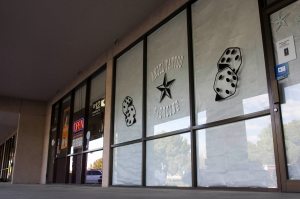Tattoo News – Mesa council rejects tattoo parlor’s bid

Got ink? That’s out of the question at one Mesa intersection.
Mesa council deciding tattoo parlor’s fate
The City Council late Monday night rejected a tattoo parlor
application in a 6-1 vote, with Mayor Scott Smith the lone dissenting
voice on what turned into a deeper, philosophical debate about the
city’s decision-making process for businesses of the tattoo parlor,
pawn shop or plasma center nature.
It also forced the question of whether such businesses tend to follow or create a declining neighborhood.
Ultimately, council members voting in opposition of Angel Tattoo,
proposed for Dobson and Baseline roads, cited reasons ranging from
incompatibility with the neighborhood, concentration of such businesses
and intense opposition from the neighbors.
They also characterized the parlor as a business that would bring no
economic value to Mesa because there’s no sales tax charged on such
services.
Such establishments have to satisfy a stipulation of being outside a
1,200-foot buffer from the same type of service, or a school. They also
require a council-use permit, which is based on what’s acknowledged to
be a subjective judgment call on whether such a business would be a
detriment to the neighborhood.
Smith, however, said while he isn’t necessarily a fan of tattoos
personally, he wasn’t convinced that there were any tangible concerns
over tattoo parlors, other than a negative “perception.”
Mesa planning director John Wesley described these as a classic
“chicken and egg” conundrum, with there being no specific indication
one way or the other, but the perception exists that as a bunch, these
businesses contribute to a decline.
Smith said the perception may stem from how the businesses advertise
their storefronts: flashing lights, neon. The way to deal with that
would be to demand a higher standard, the mayor added.
He said he would apply the same standard for a tattoo parlor as a “lemonade stand.”
“I have a real concern over the subjective approach” of the process, Smith said.
“I don’t get tattoos … It’s not my right to understand the choices
(people make). But I (also) wouldn’t support a lemonade stand that has
gaudy signs,” Smith said.
Councilman Dennis Kavanaugh, who was on the council in 1997, when
use permits were established for tattoo parlors, said the goal at the
time was to address the issue of “overconcentration” of those
businesses, as well as payday loan centers and massage parlor-type
establishments. In addition to limiting their use, the city also sought
input from neighbors before new applications were accepted. But
Kavanaugh also seemed amenable to reexamine the city’s zoning code to
see if “what we have is best practice.”
The planning and zoning board had, in February, recommended denial
of this application, although board member Scott Perkinson questioned
whether the current discretionary option with the council was fair.
Kavanaugh, who represents the west Mesa district where the Angel
Tattoo site was leased, staunchly opposed the application from the
outset.
Kavanaugh agreed with the Dobson Ranch Homeowners Association that
the neighborhood doesn’t need another tattoo parlor when it already has
two close by. The strip mall also has what he considers a concentration
of other unseemly businesses: a massage parlor and a payday loan
center, and even more in the neighborhood.
In Monday’s two-hour debate, those in favor of Angel Tattoo parlor
opening at Dobson and Baseline roads, said it was being hurt by a
negative perception without any real facts backing it.
Jeff Welker, representing the tattoo parlor owner, Ryan Coleman,
urged the council to treat the application the same way as a 2006
application for another tattoo parlor, Damage Ink, which has since
closed.
In that case, the council made an exception and allowed the parlor
to open, despite being within the 1,200-foot buffer of Dobson High
School, because none of the other concerns associated with negative
perceptions were seen to have any tangible merit.
Welker said this time, the site met all requirements, which should
make for an even easier decision for the council. But he said it was
clear the council was treating this application differently from the
Damage Ink one, because this time the concentration of uses was being
taken into account.
“I have a serious concern that an informal criteria is being
established by which Ryan Coleman’s application is being evaluated than
the last one,” Welker said, of the negative perception about tattoo
parlors.
But those opposed, including dozens of residents who showed up at
the meeting, said the neighborhood and its property values would
decline, and it would attract society’s negative elements such as gang
members, thereby increasing chances of criminal activity. The tattoo
site is close to Rhodes Jr. High School, although outside the required
1,200-foot buffer, another strong concern from the neighborhood
association.
Joanne Smith, a Dobson Ranch resident, questioned whether the
business would be able to keep a pledge of not doing any racist or gang
tattoos, or how the city would track such activity. She added that such
an establishment is best placed in a more commercial area.
West Mesa resident Dawn Roberts, however, urged the council to
“update” their impression of who gets tattoos and that these are part
of “mainstream culture, not seedy back alley places.”
Meanwhile, the Goldwater Institute has filed suit in a similar case
in Maricopa County Superior Court against Tempe, on grounds that the
City Council violated the equal protection clause and the free speech
rights of a couple by not allowing them to set shop in Tempe. The
couple run Mesa tattoo parlor Virtual Reality.
Goldwater attorney Carrie Ann Sitren told the Mesa City Council
about the case and urged them to consider these issues before they make
a decision.
Kavanaugh, a lawyer by profession, dismissed the Goldwater
Institute’s interpretation, saying there are differences in the two
cases and that if taken to the extreme, cities would not be able to
have any zoning codes.
sources: 1

Leave a Reply